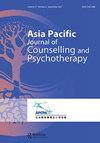Validity of relational meaning in life scale in Chinese high school students between rural and urban area
IF 0.2
4区 心理学
Q4 PSYCHOLOGY, CLINICAL
Asia Pacific Journal of Counselling and Psychotherapy
Pub Date : 2023-11-08
DOI:10.1080/21507686.2023.2278035
引用次数: 0
Abstract
ABSTRACTThe study aims to examine the cross-cultural applicability and psychometric properties of the Chinese version of the Relationship Meaning in Life (RMIL) scale By collecting data from 3583 high school students in economically disparate urban and rural areas in China, we seek to explore whether this measure demonstrates cross-cultural validity and reliability and investigate its unique explanatory power in addition to meaning in life (MIL). Our results support the two-factor structure of RMIL and its measurement invariance in gender and area. The correlation pattern and mediation model support the RMIL, which is not redundant to the variable meaning in life. The IRT and factor analysis results indicated some future concerns about specific item problems. Cultural and areas differences have been discussed.KEYWORDS: Relational meaning in lifemeaning in lifeChinese high school studentsitem response theory Disclosure statementNo potential conflict of interest was reported by the author(s).Additional informationNotes on contributorsHaocheng HuangHaocheng Huang is a counselor in South China Normal University. He gains both bachelor degree and master degree in psychology from South China Normal University. His research interests are in adolescent relationships, sense of meaning, and counseling techniques.Zhaoming ChenZhaoming Chen is a graduate student from the Chinese University of Hong Kong, Shenzhen. He received the bachelor's degree in psychology from the South China Normal University. His research primarily focus on meaning in life and well-being.Yingtao MengYingtao Meng is a graduate student from the Chinese University of Hongkong, Shenzhen. She completed her undergraduate study in Jilin University. Her research interest is in counselling and aging.Zizhen FengZizhen Feng is a graduate student from the Chinese University of Hong Kong, Shenzhen. She received her bachelor's degree from the University of California, Irvine. Her research interest is in preschool education and child development.Xuelan LiuXueLan Liu is a Professor of Educational Psychology at South China Normal University. Her main research interests include mental health of children and adolescents, parent–child relationship, intimate relationship, monitoring and control in metacognition.中国城乡高中生生活量表中关系意义的效度
摘要本研究以3583名来自中国经济差异较大的城乡地区的高中生为研究对象,考察了中文版关系生活意义量表(RMIL)的跨文化适用性和心理测量学特征,探讨了该量表是否具有跨文化的效度和信度,并考察了其在生活意义量表之外的独特解释力。我们的研究结果支持RMIL的双因素结构及其在性别和地区上的测量不变性。相关模式和中介模型支持RMIL,它对生活中的变量意义不是冗余的。IRT和因子分析的结果显示了未来对具体项目问题的一些关注。已经讨论了文化和地区差异。关键词:生活中的关系意义生活中的意义中国高中生项目反应理论披露声明作者未报告潜在的利益冲突。作者黄绍成黄浩成是华南师范大学的一名辅导员。毕业于华南师范大学心理学学士和硕士学位。他的研究兴趣是青少年关系、意义感和咨询技巧。陈兆明,香港中文大学深圳分校研究生。他获得华南师范大学心理学学士学位。他的研究主要集中在生活的意义和幸福。孟应涛,香港中文大学深圳分校研究生。她在吉林大学完成了本科学习。她的研究兴趣是咨询和老龄化。冯子珍,香港中文大学深圳分校研究生。她获得了加州大学欧文分校的学士学位。主要研究方向为学前教育与儿童发展。刘雪兰,华南师范大学教育心理学教授。主要研究方向为儿童青少年心理健康、亲子关系、亲密关系、元认知中的监测与控制。
本文章由计算机程序翻译,如有差异,请以英文原文为准。
求助全文
约1分钟内获得全文
求助全文

 求助内容:
求助内容: 应助结果提醒方式:
应助结果提醒方式:


